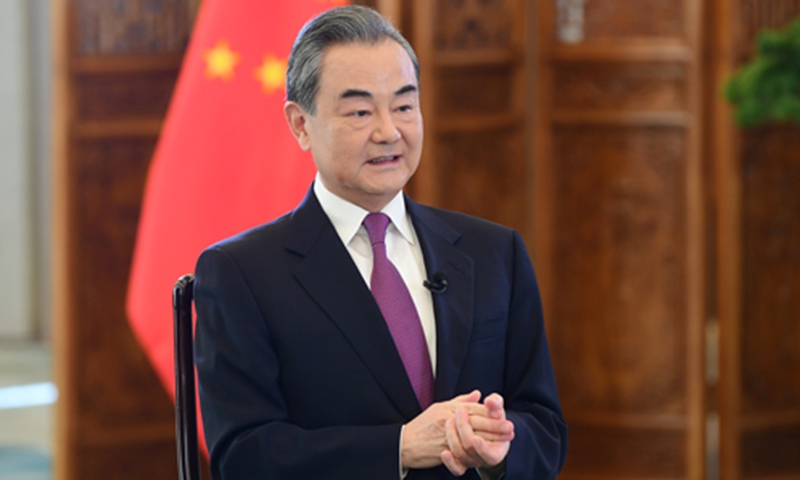China will not fill the so-called power vacuum after US pullout; Mideast countries ‘should control own destiny’

China's State Councilor and Foreign Minister Wang Yi
China disagrees that there is "power vacuum" in the Middle East that needs to be filled, said Chinese State Councilor and Foreign Minister Wang Yi recently, while the hasty US pullout from the region in 2021 has caused ongoing chaos in the region.
In the same week of the first month of 2022, six Middle Eastern countries including major regional ones such as Saudi Arabia, Iran and Turkey all sent their top diplomats to China and to seek more and deeper cooperation or to reinforce and consolidate the existing partnerships. Chinese analysts said the weakening US presence in the region has caused rising concerns among the regional countries, and they have realized that ties with China will be significant for the region in the future.
But China boosting ties with the Middle East is not based on hegemonic ambition but on common interests and mutual respect. China will not seek to replace the US role in the region, nor does the Middle East need major foreign powers to intervene in regional issues, because they should learn to solve their problems on their own, said Chinese experts.
"The Middle East has a long history, unique cultures and plentiful natural resources, but at the same time, the region is suffering from long-existing unrest and conflicts due to foreign interventions," Wang told media on Saturday after meeting with the Foreign Ministers of Saudi Arabia, Bahrain, Kuwait, Oman, Turkey and Iran and the Secretary General of the Gulf Cooperation Council (GCC).
"China has always supported the Middle East to realize stability and to speed up its development. We believe the people of the Middle East are the masters of the Middle East. There is never a 'power vacuum,' and there is no need of 'patriarchy from outside,'" Wang said.
From January 10 to Saturday, Wang held talks with the foreign ministers of the six Middle Eastern countries and the GCC Secretary General in Wuxi, East China's Jiangsu Province.
"Some US politicians and elites actually want China to fill the 'power vacuum' left by the US after they realized that their deep interference in the Middle East has brought the US more trouble than benefits. They're hoping that China will repeat their mistakes, so China would become mired in the complex situation of the Middle East and China's strength will be weakened," said Yin Gang, a research fellow at the Institute of West-Asian and African Studies at the Chinese Academy of Social Sciences on Sunday.
In recent years, Western media and scholars have hyped China's rising influence in the Middle East alongside the routes of the Belt and Road Initiative, such as the establishment of a logistics base in Djibouti on the Horn of Africa and signing a 25-year strategic agreement with Iran. These Western voices are trying to shape a narrative of China's rising "hegemony" with ambitions to replace the US in the region, said analysts.
"China will not be fooled and will not step into the trap, this is the message that the Chinese foreign minister wants to convey by mentioning the term 'power vacuum,'" Yin emphasized, saying that cooperation between China and the Middle East will always be based on equality, complementarities, mutual respect and shared benefits, rather than unilateral massive input from China based on hegemonic ambitions.
Wang said that facts have repeatedly proven that the international community may contribute to stability in the Middle East but it should not create trouble. The Middle East needs development, and regional countries can learn from external models but should not directly copy those models.
"Neo-liberalism is not a panacea," Wang told media.
Li Shaoxian, director of the China Institute for Arab Studies at Ningxia University, told the Global Times on Sunday, "The Middle East is a place where its people have been unable to control their own destiny for a very long time, instead, they have seen interventions or control from external forces for quite a long time."
This is because there is no local power that can effectively solve regional problems and unify the people that is able to resist foreign invasions launched by Western colonialists and imperialists.
Wang mentioned the term "neo-liberalism" because of the US-led interventions in the region, Li said.
"Under the ideological instruction of neo-liberalism, the Greater Middle East Projects proposed by the US after the 9/11 that tried to spread Western democracy and the 'Arab Spring' encouraged by the West for similar reasons since 2010 have brought disastrous consequences," Li noted.
The current appalling chaos resulting from the Iraq War launched by the US and the hasty pullout from Afghanistan last year show that the "democracy" that the West imposed on the Middle East does not work and is a complete disaster, experts said.
"Middle East countries should find their own ways to solve their challenges and problems instead of relying on external forces," said Li
The difficulty for regional countries to realize real independence and development lies in effective resistance to foreign interventions, experts said, because the US will keep interfering in regional issues even though Washington is reducing its presence.
Regional countries like Saudi Arabia, Turkey and Iran should realize that some of conflict between them was actually hyped and used to serve US strategy as a means to provide the legitimacy to intervene, so it would be unwise and unnecessary to maintain the hatred and hostility toward one another after the US pullout, Chinese analysts said.
Photos
Related Stories
- Intensive interaction between China, Mideast countries to strengthen ties
- China, Iran jointly announce implementation of bilateral comprehensive cooperation plan
- Chinese, UAE FMs talk about bilateral cooperation over phone
- Chinese, Kuwaiti FMs hold talks on bilateral ties
- Chinese, Turkish FMs hold talks on bilateral ties
Copyright © 2022 People's Daily Online. All Rights Reserved.










